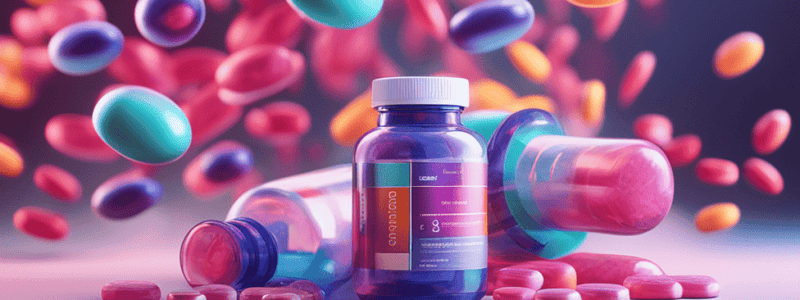Podcast
Questions and Answers
Which neurotransmitter is primarily targeted by typical antipsychotic drugs?
Which neurotransmitter is primarily targeted by typical antipsychotic drugs?
- Dopamine (correct)
- Acetylcholine
- Norepinephrine
- Serotonin
Which generation of antipsychotics is associated with increased efficacy for negative symptoms of schizophrenia?
Which generation of antipsychotics is associated with increased efficacy for negative symptoms of schizophrenia?
- First generation (Typical)
- Second generation (Atypical) (correct)
- Fourth generation
- Third generation
Which neurotransmitter is primarily targeted by typical antipsychotics?
Which neurotransmitter is primarily targeted by typical antipsychotics?
- Dopamine (D2) (correct)
- Norepinephrine (NE)
- Glutamate (NMDA)
- Serotonin (5-HT)
Which of the following is NOT a symptom of Tardive Dyskinesia (TD)?
Which of the following is NOT a symptom of Tardive Dyskinesia (TD)?
Which antipsychotic may provide better outcomes than typicals for negative symptoms?
Which antipsychotic may provide better outcomes than typicals for negative symptoms?
What is the onset period for Neuroleptic Malignant Syndrome (NMS)?
What is the onset period for Neuroleptic Malignant Syndrome (NMS)?
Which symptom occurs as a result of long-term dopamine receptor blockade?
Which symptom occurs as a result of long-term dopamine receptor blockade?
Which antipsychotic medication has the least metabolic syndrome and may have the least extrapyramidal symptoms?
Which antipsychotic medication has the least metabolic syndrome and may have the least extrapyramidal symptoms?
Which medication is considered first-line for treatment-refractory schizophrenia and is associated with agranulocytosis?
Which medication is considered first-line for treatment-refractory schizophrenia and is associated with agranulocytosis?
Which antipsychotic medications can be used to increase compliance with treatment and have the advantage of reduced risk of unintentional or intentional overdose?
Which antipsychotic medications can be used to increase compliance with treatment and have the advantage of reduced risk of unintentional or intentional overdose?
Flashcards are hidden until you start studying
Study Notes
Antipsychotic Drugs Overview
- Typical antipsychotic drugs primarily target dopamine neurotransmitters, specifically D2 receptors.
- Atypical antipsychotics are noted for having increased efficacy for negative symptoms of schizophrenia, which include lack of emotion and motivation.
Tardive Dyskinesia (TD)
- Symptoms of Tardive Dyskinesia may include involuntary movements, facial grimacing, and tongue movements.
- Tardive Dyskinesia is characterized by abnormal, repetitive movements that can occur as a long-term effect of antipsychotic use.
Neuroleptic Malignant Syndrome (NMS)
- The onset period for Neuroleptic Malignant Syndrome can develop within days to weeks after initiation of antipsychotic medication.
- NMS is a potentially life-threatening condition marked by muscle rigidity, fever, and autonomic instability due to dopamine receptor blockade.
Antipsychotic Efficacy and Side Effects
- Clozapine is considered a first-line treatment for treatment-refractory schizophrenia but is associated with the risk of agranulocytosis, a potentially serious decrease in white blood cells.
- Aripiprazole is recognized for having the least metabolic syndrome effects and may lead to fewer extrapyramidal symptoms compared to other antipsychotics.
Compliance and Safety in Treatment
- Long-acting injectable antipsychotics can enhance treatment compliance by reducing the risk of unintentional or intentional overdose due to their sustained release formulations.
- These medications mitigate the risks associated with oral formulations, which may be improperly taken by patients.
Studying That Suits You
Use AI to generate personalized quizzes and flashcards to suit your learning preferences.




